Introduction
In the digital age, the development of the information society is becoming one of the key factors influencing economic growth dynamics, social cohesion and international competitiveness (Potocki, 2019; Ziemba, 2017). In this context, Poland as an economy aspiring to be an innovation leader in the CEE region is an interesting case to analyse.
The Information Society Development Index is a measure that assesses the extent to which society uses information and communication technologies to promote prosperity and opportunities (Ziemba, Zelazny, 2013). However, the available data is rarely analysed in a regional context, and particularly at NUTS 2 level, which allows differences between regions to be identified and understood, and more effective political strategies to be developed. The analyses carried out cover various aspects, one of which is the use of information and communication technologies (ICT) in households (Pekasiewicz, Szczukocka, 2017).
The advancement of the information society is one of the most important indicators of a country’s modernity and readiness for the future. Although the literature on ICT use is extensive, few studies focus on spatial analysis in Poland, which is a significant gap in information society research. In the context of globalisation and increasing digitalisation, the even spread of information and communication technologies is becoming the basis for sustainable economic and social development.
The literature on the use of ICT is very extensive and includes academic publications, reports and statistical studies. Papers are available on the impact of ICT on the economy at global, regional and national levels. The use of ICT in individual regions is measured using various indicators and research methods. However, access to data collected by public statistics is limited when compared to the need for information (Wojnar, 2020). Therefore, a decision was made to base the scientific analyses conducted in this thesis on the data available in the statistical studies of the Central Statistical Office.
This is why this article aims not only to diagnose the state of ICT use in spatial terms (NUTS 2, layout S – by wall/region) in 2021, as well as to highlight potential implications for public policy. The analysis based on statistical data from the Central Statistical Office aims to fill an existing research gap by providing knowledge on regional differences in ICT use and their impact on information society development strategies in Poland. Therefore, this work makes an important contribution to science by offering new perspectives on the dynamics of regional differences in the use of information technology, which is essential for policy makers seeking to maximise the benefits of digitisation while minimising the risk of digital exclusion.
The nature and development of the informa- tion society
The rapid growth of the information sector as a result of industrial and commercial development was already evident in the second half of the 19th century. However, what occurred in the 1970s when microelectronic technology enabled the computerisation of much intellectual and office work, deserves to be called a new stage in the development of humanity.
Since the end of the Second World War, sociologists have made numerous attempts to define and name the social change taking place. They started by referring to the ‘lonely crowd’ (Riesman, 1950) and the ‘post-historical man’ (Goban-Klas, Sienkiewicz, 1999), to the ‘organisational revolution’ (Boulding, 1953) and the ‘organisation man’ (Whyte, 1956), arriving at terms such as the ‘communication revolution’ (Williams, 1982), the ‘information age’ (Dizard, 1985) and the ‘information society’ (Białobłocki, 2008).
American sociologist Daniel Bell, creator of the term ‘post-industrial society’ (Bell, 1973) was the pioneer of scientific studies of this new type of society. The term ‘information society’ was first used by sociologist Tadao Umesao in 1963, however, this category was popularised by another Japanese scholar, i.e. Keinichi Koyame (Białobłocki, 2008). A description of the most detailed characteristics of the changes taking place in society was provided by Yoneji Masuda (Goban-Klas, Sienkiewicz, 1999).
In everyday discourse, the information society is characterised by the increased importance of information and knowledge, as well as techniques and devices for its transmission and processing. Communication and information techniques are therefore inseparable from the essence and development of the information society. It could even be argued that they are one of its important causative factors (Kordha, Sevrani, Gorica, 2015).
Development and applications of information technologies in the network society
The development of information technologies has set in motion the information revolution also known as the electronic revolution, through which traditional industrial society has undergone a massive transformation. ICT infrastructure is not equally important for all types of projects related to human activity systems. Nevertheless, there is no doubt that the quality of such an infrastructure is a decisive factor in ensuring success and competitiveness in design, scientific research, manufacturing, banking, tourism, insurance or mass communication (Przystupa, 1996; Al- Mannaei, Al-Jayyousi, Mahmood, Dornberger, Al- Jayousi, 2023; Mance, Vilke, Debelić, 2023).
The development of information and communication technologies is a fascinating process that started decades ago and is constantly evolving, transforming all aspects of human life.
In the beginning, ICT focused on simple data-processing machines such as the first computers, which were large and expensive, limiting their availability to large institutions. Over time, inventions such as the transistor and microprocessor made miniaturisation and cost reduction possible, making personal computers accessible to a wider audience (Smyrnova- Trybulska, 2018).
The 1980s and 1990s saw a significant development of computer networks and the Internet in particular, which revolutionised the way we communicate and access information. The spread of the Internet has been a catalyst for the development of new forms of social and business interaction, such as email, instant messaging, social networking platforms and e-commerce (Hofmokl, 2009).
The digitisation of media, i.e. books, music and films, was a breakthrough in access to information, which also revolutionised the entertainment, education and publishing industries. The development of wireless technologies such as Wi-Fi and next-generation mobile networks (3G, 4G and later 5G), has enabled users to access the Internet from almost anywhere in the world (Ahmad, Rodriguez, Huusko, Seppanen, 2023).
Today, technologies such as cloud computing, big data, the Internet of Things (IoT) and artificial intelligence (AI) are at the forefront of ICT innovation. Clouds make it possible to store of vast amounts of data and provide access to computing power on demand, IoT connects the physical world to the digital one through smart devices, and AI contributes to the creation of intelligent systems capable of learning and decision-making (Kim, Gil, Kim, Kim, 2023).
The last decade has shown that ICT development shows no signs of slowing down. On the contrary, continuous innovation in areas such as semiconductors, algorithms and quantum technologies draws a picture of a future in which the boundaries of technological possibilities will be pushed continuously. Importantly, these technological advances bring not only new tools and opportunities but also challenges related to the governance, security and ethics of ICT use (Chomiak-Orsa, 2012).
ICT applications in the network society are versatile and expand rapidly. A number of key areas can be mentioned here, as shown in Fig. 1.
Figure 1
Classification of basic ICT application areas
Source: own elaboration based on Lakomy, M., Oświecimski, K. (2017). Governance and New ICT in the Public Sphere. Kraków: WAM Publishing House.
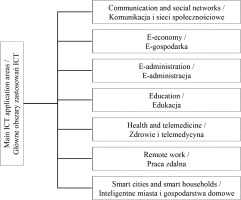
Communication and social networking are one of the most important application areas of ICT. The Internet and information technologies have enabled the emergence of global social networks that have changed the way people communicate and build relationships. Platforms such as Facebook, Twitter and LinkedIn have become places to exchange ideas, share experiences and conduct business.
There are also many aspects of the economy that have been revolutionised by ICT, such as electronic payment systems, e-commerce and supply chain management. The use of information technology in this area has created new business models and markets.
Public administrative services are increasingly available online, making it easier for citizens to access the information and services they need, while at the same time increasing administrative efficiency. This digitisation of public services not only makes citizens’ daily lives easier but also opens up new opportunities for businesses, enabling them to deal with formalities more efficiently and use the administration as a partner in expanding their activities. In addition, the development of these online services is a key element in the state’s strategy to build digital inclusion and remove barriers to accessing public services for all social groups, especially in less urbanised and less accessible regions.
Information technologies have opened up new opportunities for education and health, for example by allowing access to educational resources via the Internet, which is changing the paradigm of learning and teaching, as well as enabling remote monitoring of patients’ health, which is particularly important in sparsely populated or hard-to-reach areas.
Developments in ICT and fast Internet access make remote work possible, which is changing both the labour market and people’s daily lives. In addition, information technologies are increasingly being used in the management of cities and homes, leading to the creation of smart systems designed to increase energy efficiency, safety and comfort of life.
The continuous and dynamic development of ICT and its applications in the networked society provide the foundations for further innovation, as well as give rise to challenges. Key challenges include data security, privacy and equal access to technology. In Poland, as in other countries, progress in this area is uneven, leading to significant regional variations, which will be the subject of further scientific consideration. It will be based on data from the Central Statistical Office (CSO), so it is worth outlining briefly the methodology of the statistical surveys.
Material and methods
The Polish Central Statistical Office is the key public institution responsible for collecting and publishing statistical data on various aspects of social and economic life, as well as the environment. As a national statistical body, the CSO operates under the Polish law, in particular the Act on Public Statistics, which guarantees its independence and objectivity.
Table 1
Attributes of reliability of CSO statistics
[i] Source: own elaboration based on https://stat.gov.pl/portal-edukacyjny/co-to-jest-statystyka-publiczna/jakosc-w-statystyce .
The scope of the research included households with at least one person aged 16-74. A household is defined as a group of related or unrelated persons living together and jointly supporting one another (a multiperson household) or a person supporting himself or herself, whether living alone or with others (a single-person household).
The subject of the research was ICT use in households in 2021 and it was conducted in 2022. The use of ICT in households was a sample survey conducted using the face-to-face and telephone interviews (by interviewers) and by means of an online survey. A two-stage sampling scheme with stratification at the first stage was applied. First level units (JPS) were drawn first, followed by dwellings. The total number of dwellings in the core sample was 8100 (CSO, 2022).
The results of the household survey selected for the purpose of this paper are presented in the cross-section of layout S by NUTS 2 wall/region, which allowed a spatial analysis of ICT use in households in the three regions shown in Table 2.
Table 2
Division of Poland by wall/region
Spatial analysis of ICT use in households in Poland in 2021
In 2021, the world continued to grapple with the consequences of the COVID-19 pandemic, which had an undeniable impact on household ICT usage patterns. The pandemic accelerated digitalisation processes and significantly increased reliance on digital technologies in various aspects of life from education and work to consumption and social communication. In Poland, as in the rest of the world, we have seen dynamic changes in the use of ICTs, both in response to restrictions put in place to combat pandemics and as a result of the natural digital evolution. Figures from the Central Statistical Office’s 2021 report show a significant increase in Internet use among households, with the percentage of households with Internet access increasing in recent years to over 90%. In addition, there was a significant increase in the number of people using e-banking and e-commerce services, which was directly linked to restrictions on access to on-site services.
In response to the COVID-19 pandemic, many public and private institutions have accelerated the digitisation of services, which is manifested in increased online service offerings, including in public administration, education and healthcare.
These developments reflect the broader trend of digitisation that has been further accelerated by the pandemic, highlighting the flexibility and adaptability of Polish society in the face of challenges, as well as pointing to directions for further development of the country’s digital infrastructure and competences.
The Central Statistical Office’s statistics for 2021 provide valuable insight into this process, allowing observation of how different regions of the country are adapting to life in an increasingly computerised world. This part of the study is focused on the analysis of such data to identify patterns (e.g. geographical differences in Internet access, differences in the use of digital services) and disparities in ICT use that can serve as a foundation for future information society development strategies in Poland. These patterns indicate significant differences in adaptation to the digital world, which has direct implications for public policy, including the need to adapt information society development strategies to the specific characteristics of individual regions. Understanding these disparities is key to designing effective interventions to reduce digital exclusion and promote equal access to information technology for all citizens.
Figure 2
Internet access in households (absolute numbers)
Source: own elaboration based on CSO statistics.
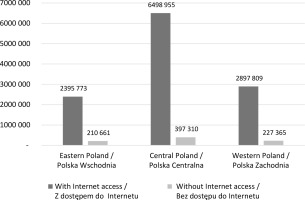
The most favourable proportions in terms of the households’ access to the Internet can be observed in Central Poland, where only 5.8% of households have no access to the Internet while as many as 94.2% have it. The situation is worst in Eastern Poland where these proportions are: 91.7% with access and 8.1% with no access.
When it comes to types of Internet connections, the highest number of households with Internet access via broadband connections can be found in Central Poland, i.e. 93.6%, followed by Western Poland (91.5%) and Eastern Poland (91.3%). It should be noted at this point that a broadband Internet connection is a type of connection that enables high-speed data transfer, often via various technologies such as DSL, cable, fibre, satellite or LTE/5G. Therefore, it is the optimum technological solution to use for data transmission, allowing more information to be transmitted at the same time.
Figure 3
Internet usage in households (absolute numbers)
Source: own elaboration based on CSO statistics.
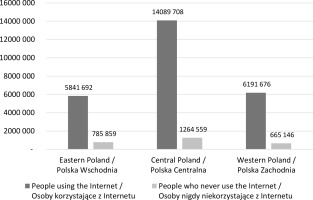
91.8% of households in Central Poland use the Internet, there are slightly fewer of them in Western Poland (90.3%) and the fewest in Eastern Poland (88.1%).
Figure 4
Frequency of Internet use in the last 3 months (absolute numbers)
Source: own elaboration based on CSO statistics.
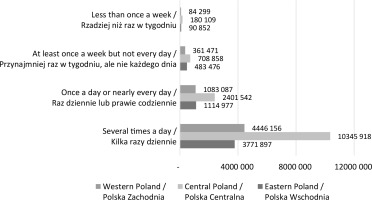
The Internet is used most frequently, i.e. several times a day, in Central Poland (67.4%), followed by Western Poland (64.8%) and then Eastern Poland (56.9%). Taking into account the purpose of using the Internet for private matters, up to 83.3% use the Internet for communication in Central Poland, 81.4% in Western Poland and 75.3% in Eastern Poland. In terms of access to information, the percentage of Internet use in households in Central Poland is 82.3%, with 80.1% in Western Poland and 75.9% in Eastern Poland. The percentage of participation in social and political affairs using the Internet is low in households in Eastern Poland (9.4%), and much higher, almost equal in Western Poland (15.1%) and Central Poland (15.3%). When it comes to Internet use for entertainment and e-health, again the highest percentage was recorded in Central Poland, followed by Western Poland and the lowest result in Eastern Poland. Interestingly, when considering other online services, i.e. selling goods or services via a website, app (e.g. Allegro, OLX, eBay) or online banking, the highest percentage of households using the Internet for this was recorded in Western Poland (60.5%), followed by Central Poland (59.7%) and the lowest in Eastern Poland (52.1%).
Table 3
Remote working in the last 3 months (absolute numbers)
The highest percentage of remote workers was recorded in Central Poland, i.e. 24.5%, and the lowest one in Eastern Poland at 13.1%. Central Poland have a significantly higher number of people working remotely, which may reflect a higher level of digitisation of workplaces and greater flexibility in working patterns. In contrast, this figure is much lower especially in Eastern Poland, which may reflect differences in the nature of the work that may be less suitable for digitisation or constraints due to the lower availability of digital services. It should also be noted that the number of non-remote workers is high in all three regions, which may point to the potential for further digitisation and the existing barriers that need to be overcome in order to make greater use of remote working.
Figure 5
Reasons for doing e-learning activities in the last 3 months (in percentage)
Source: own elaboration based on CSO statistics.
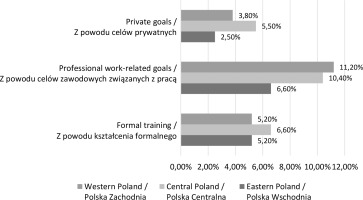
The following conclusions can be drawn from the analysis of above data:
regional differences – each region has its preferences for online learning goals, with Western Poland focusing more on profes- sional development and Central Poland on private goals;
professional development appears to be a significant driver for online learning in Po- land. There is a clear indicator that the need for work-related learning is being felt across the country, which probably reflects the de- mands of today’s labour market.
When analysing the popularity of online public services, one can conclude that websites and applications of public administration units are used rather frequently in Poland. In addition, there are some regional differences in the use of digital government services. Western Poland has the highest percentage of users (57.5%), which may reflect better accessibility or greater awareness of digital services in this part of the country. The difference in the use of public administration e-services between Central and Western Poland is minimal (only 0.3 percentage points), suggesting a similar level of digital infrastructure development and commitment to transforming public services in these regions. The specific purposes of the applications are shown in Figure 6.
Figure 6
Purposes of Internet use for contacts with public administrations (percentages)
Source: own elaboration based on CSO statistics.
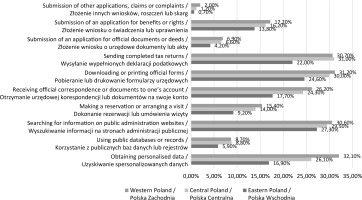
The comparison of methods of filing the tax return (PIT) in the analysed parts of Poland demonstrates that the highest percentages of people filing their returns via a website or application was recorded in Central Poland (31%) and Western Poland (30.7%), and the lowest percentage was recorded in Eastern Poland (22%). The data shows that a large proportion of residents in Central and Western Poland prefer to file their tax returns electronically, demonstrating that digital solutions are more widespread in these regions. There is a noticeable difference in the percentage of people filing their tax returns online between the different regions of Poland. Central and Western Poland have similar levels of digital adaptation, while the figure for Eastern Poland is much lower. Residents of Central and Western Poland may be more inclined to use modern, electronic methods of communication with the tax administration, which may reflect their higher digital awareness or better education in the use of technology.
Figure 7
People ordering goods or services online for private use in the last 12 months (percentages)
Source: own elaboration based on CSO statistics.
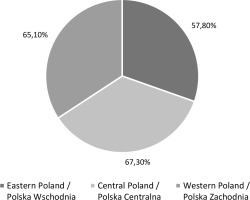
The following conclusions can be drawn from the analysis of the above data:
online shopping preferences are regionally differentiated, with Central Poland showing the highest propensity to use online shop- ping, which may be due to greater availabil- ity of online services, higher per capita in- come or greater awareness of the benefits of e-commerce;
the development of digital infrastructure in Poland varies, which may be particular- ly noticeable when comparing regions with a different degree of urbanisation and level of economic development. The term ‘unequal’ as used in the context of digital infrastruc- ture development refers to the existing dis- parities in access to high-speed Internet, which result from both technological and economic barriers. For example, according to the Central Statistical Office and reports on digitisation, Eastern Poland demonstrates a lower percentage of households with broad- band access compared to other regions of the country. The differences may be due to lim- itations in the expansion of telecommunica- tions infrastructure due to lower population density, more difficult geographical condi- tions or lower profitability of investments for operators. In addition, economic barriers such as lower household income levels can af- fect the ability to use digital services, further exacerbating digital disparities.
e-commerce growth potential – low rates in eastern Poland may point to the potential for growth of the region’s e-commerce market if infrastructure barriers are overcome and awareness of the benefits of online shopping is raised.
Clothing, footwear and accessories were the most frequently purchased goods, i.e. over 39% in Central and Western Poland, and around 10 p.p. less in Eastern Poland. Even more significant discrepancies were observed with regard to meals ordered from restaurants, fast-food outlets or in the form of catering, i.e. the percentage was only 5.3% in Eastern Poland, 10% in Western Poland and 10.2% in Central Poland. Online purchases of printed books, magazines and newspapers are similar, i.e. they account for only 3.9% in Eastern Poland, 8.6% in Western Poland and as much as 9.1% in Central Poland.
Figure 8
Purchase of transport or accommodation services via the Internet (percentages)
Source: own elaboration based on CSO statistics.
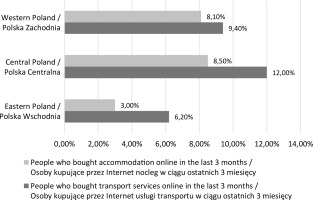
The following conclusions can be drawn from the analysis of the above data:
online purchases of accommodation services are less popular than purchases of transport services in all the analysed regions;
Central Poland has the highest percentage of people buying both types of services online, which may point to a greater propensity to use online services or better availability of such services;
Eastern Poland has the lowest percentage rates of online shopping for both accommo- dation and transport services, which may re- flect differences in Internet access, shopping preferences or service availability;
the difference between purchases of transport and accommodation services is greatest in Central Poland, which may suggest that there is a stronger culture of booking trans- port services online or a greater range of such services in the region.
Table 4
Financial activities performed over the Internet for private purposes in the last 3 months (absolute numbers)
The data shows that the purchase of insurance policies and other related services is the most popular financial activity performed online, which may indicate a growing awareness of insurance and trust in online transactions. However, it should be noted that the percentage of people who buy or sell stocks or other investment services is relatively low, which may suggest the lower popularity or availability of these online services compared to traditional investment methods.
There is a clear regional divide in terms of doing financial activities online, where Central and Western Poland seem to be more active compared to Eastern Poland. This may reflect differences in economic development and Internet infrastructure in these regions.
Table 5
People who have performed selected software-related activities in the last 3 months (percentages)
The analysis of the above data offers some interesting observations regarding the use of software in Poland. There are clear regional differences in the use of the Internet and related tools. Central Poland has the highest percentage of people using advanced tools such as word processors and spreadsheets, which may reflect the higher concentration of education and business in this region. It is noteworthy that, despite high overall penetration of the Internet, the percentage of people using advanced software is relatively low in each region, indicating a potential space for the development of digital skills in society.
When analysing the data presented in Table 6, the following conclusions can be drawn regarding the spatial dimension. Smart TVs are the most popular Internet device in all regions of Poland, with the highest usage rate in Central Poland (40.6%) and the lowest one in Eastern Poland (31.1%). This is in line with the general trend of increasing popularity of smart TVs that offer access to a wide range of online services. Central and Western Poland demonstrate a similar increase in the use of games consoles (10.4% and 12.1% respectively) compared to Eastern Poland, where the rate is lower (5.8%). This may point to a greater interest in video games and better access to new technologies in these regions. A gradual increase in interest in health monitoring devices from the east to the west of Poland is evident, which may reflect growing health awareness as people move towards more economically developed regions. The use of robots is consistently low in each region (0.3%), suggesting that this is still a technological niche.
Table 6
Use of Internet of Things devices (percentages)
The following spatial trends can be observed in Poland when analysing the data in Table 7: the highest percentage of children with access to a computer can be found in Eastern Poland (62.2%), which is somewhat surprising given that the central and western regions are often perceived as more developed. This may be an indication of investments in education or the availability of programmes to support access to computers in the region. Access to tablets is highest in Central Poland (47.9%), which may reflect a greater interest in mobile educational technologies or the greater availability of these devices to children in this region. In turn, Eastern Poland has the highest percentage of children with access to smartphones (64.8%), which is interesting as smartphones are considered to be more personal and versatile devices. This may suggest that children are starting to use smartphones earlier in this region or have more autonomy in their use.
Table 7
Access of children under 16 to selected devices (in percentage)
| Details | Eastern Poland | Central Poland | Western Poland |
|---|---|---|---|
| Computer | 62.2% | 58.3% | 59.9% |
| Tablet | 45.2% | 47.9% | 45.1% |
| Smartphone | 64.8% | 61.4% | 58.1% |
The data may suggest that there is a greater emphasis in Eastern Poland on providing children with access to computers and smartphones, which can be used for both educational and entertainment purposes. Central Poland appears to be the leader in access to tablets, which may reflect a difference in attitudes towards digital education or parents’ freedom of choice of technology. Overall, the data may indicate a variety of approaches to technology depending on the region, with small percentage differences between them. This may indicate a gradual equalisation of access to technologies among children in different parts of the country.
Summary
The development of the information society is a complex process that depends on many factors. When assessing the degree of its development in different regions of Poland, many areas can be analysed, e.g. investment in ICT, e-participation rates, digital security, digital skill levels, availability of digital infrastructure, etc. The information society statistics compiled by the Central Statistical Office in Poland are based on analyses of the ICT sector and products, as well as the use of ICT by enterprises, households, and public administration entities. In conducting their analyses for this article, the authors took into account the most recent and most up-to-date CSO survey of 2022 on ICT use in households.
The article analyses the information society development in Poland, focusing on spatial variation in the context of households. First, the authors of the article explored the theoretical foundations of information society, referring to the key literature. Attention was drawn to the penetration of information and communication technologies (ICT) into all spheres of social life, shaping a new space for interaction which is the network society.
The spatial analysis of ICT use in households in Poland has revealed clear regional differences. The most advanced Internet access and the highest rates of Internet use, remote working, e-commerce, online financial activities, and online interaction with public administration were recorded in Central Poland. These figures were also high in Western Poland, however, it was behind Central Poland in most areas. In contrast, Eastern Poland had lower levels of ICT use in the analysed categories. This is an indication of a digital divide that may reflect differences in economic development and access to modern infrastructure.
However, the data shows a slightly different picture when it comes to access to selected technological devices by children under the age of 16. Eastern Poland has higher rates of access to computers and smartphones, which may result from initiatives aimed at increasing the digital competence of the younger generations in the region.
In conclusion, it seems reasonable to conclude that there is a need for an integrated policy approach aimed at reducing the digital divide between regions and ensuring a balanced development of the information society across Poland. To this end, further research and analyses are recommended as they can contribute to a better understanding of the factors influencing regional disparities in the uptake of information technologies, which should contribute to the creation of integrated development policies that will support a balanced development of the information society in Poland.

